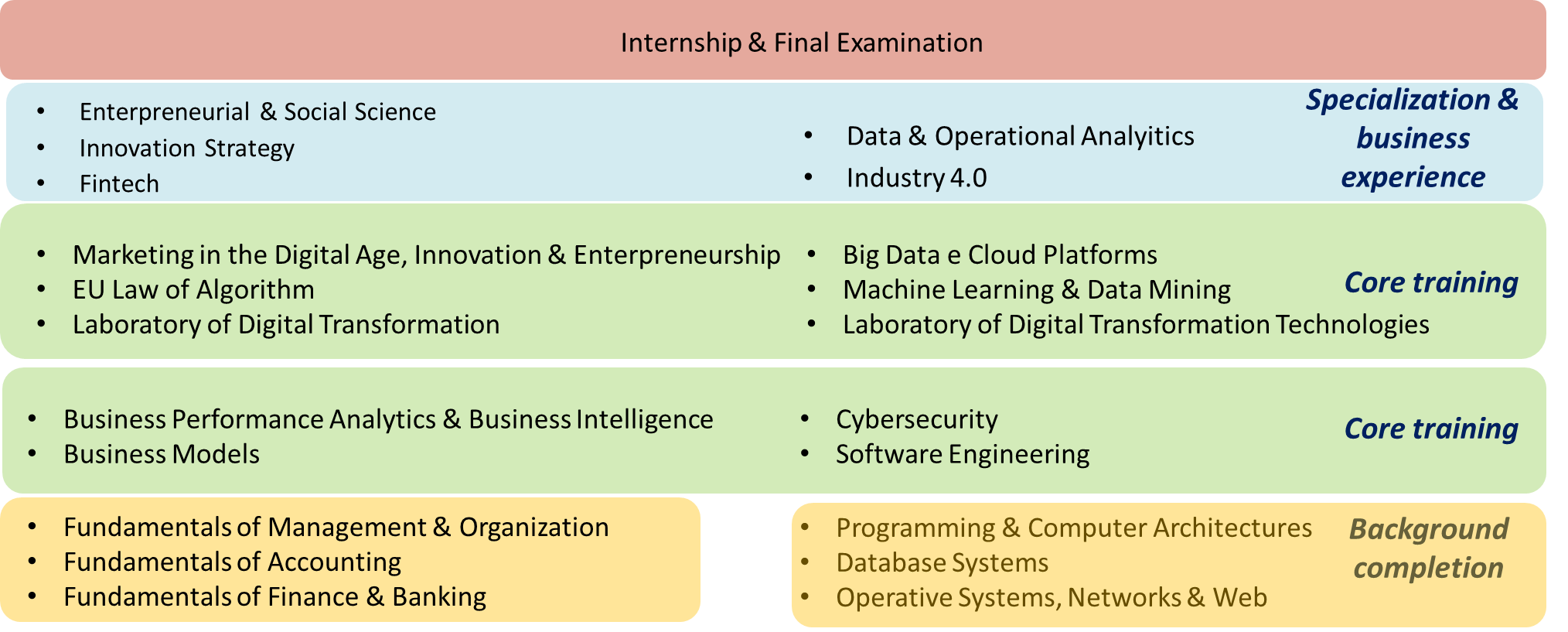The Master’s program in Digital Transformation Management at Alma Mater Studiorum – University of Bologna trains managers with strong digital skills to lead digital transformation.
An interview with the program director, Professor Matteo Golfarelli.
Professor, could you explain what "Digital Transformation Management" is?
Digital transformation is considered one of the main challenges that large and small companies in all the business sectors must face in the next few years.
The goal of Digital Transformation is to improve efficiency and effectiveness of companies exploiting the possibilities enabled by new technologies. The breadth of the transformation may range from optimizing processes to adopting a completely new business model.
Obviously, Digital Transformation is not only a technological issue but requires change of processes, people mindsets and a long term business strategy. For this reason, DTM involves both the department of Computer Science and Management.
How is the degree program structured?
The two year course is organized on three temporal phases.

We are aware the admitted students will have heterogeneous backgrounds, thus the first semester is devoted to fill the gaps (yellow area): Students with a management background will study computer science topics only, while students with a computer science background will study management topics only. Programming, database and Network must become a common knowledge as well as Accounting Finance and management
The second and the third semesters (green area) are devoted to core courses that are mandatory for all the students that will discover the techniques and technologies that drive DT: cybersecurity, artificial intelligence, Entrepreneurship and innovation management are some examples.
The last semester (azure area) is devoted to elective courses that specialize in a specific areas such as data science, IoT, fintech and digital marketing.
The degree also includes group works on industrial challenges and hackathons
Finally, all the students must carry out an internship in a company. We adopt innovative teaching techniques: face-to-face teaching is complemented by the study of use cases and a great deal of laboratory activity, especially in the field of computer science. The Cesena campus has extensive computer equipment
Who is this program designed for?
To bachelor's graduates in technology, economics and statistics disciplines. It is sufficient to have one of the aforementioned incoming backgrounds, since the gaps will be filled over the course of the two years and particularly in the first semester. Please note, building a multi-disciplinary mindset is very complex, so the characteristics we look for in our candidates are passion, willpower and mental elasticity.
What skills and knowledge do students develop?
Our goal is to train managers with strong digital skills aimed at leading digital transformation. Our graduates must have interdisciplinary skills to make them able to master innovative technologies and, at the same time, to drive organization changes
- They must be able to handle complex innovation processes and projects
- They must have entrepreneurial skills
- They must be able to operate in international business contexts
What makes DTM unique in Italy and in Europe is that it is the only two-year master degree completely devoted to Digital Transformation. Since this is a new subject, the training offer on this topic is concentrated in Executive Masters and postgraduate courses of a maximum duration of 6 months. Unfortunately, 6 months is not enough to acquire practical skills and to shape natively interdisciplinary profiles
What career opportunities does this degree open up?
I can happily say that the employment level is practically 100 percent since the demand for these profiles is currently much greater than the supply.
DTM graduates find employment in companies in all manufacturing sectors that are on a digital transformation path. For example, consider a company that manufactures machinery and first decides to sensorize it in order to perform predictive maintenance and then realizes that data monitoring allows the company to move from a sales-based business model to a rental-based one, as in the case of photocopiers. Or consider a bank that, in order to increase its level of efficiency and customer satisfaction, wants to automate certain processes and increase the number of services that can be accessed from the home banking platform.
Our graduates are particularly sought after by strategic consulting firms such as McKinsey and Boston Consulting Group that are using digital transformation as a lever of innovation.
Software houses also hire DTM graduates in roles as project and business managers, data architects, and data scientists. DTM graduates are not born to have the depth of computer skills of a software engineer, but compared to the latter they have greater interpersonal skills, application domain understanding and innovation skills. They are precisely managers and not purely technical figures.
Degree program overview
Type of degree program: Two-Year International Master Degree
Spots available: 70
Teaching mode: in-person; the courses include many laboratory activities (especially in computer science), case studies and group activities. An internship is also offered
Language: English
Attendance: Free but strongly recommended
Location: Forlì-Cesena
Deadline: I intake 10th April 2025; II intake 1st July 2025
Selection procedure: Titles and attitudinal interview
Scholarship: You can count on financial support from the start of your studies. Depending on your financial circumstances, merit or specific requirements, you may be able to apply for a reduction or exemption of the enrolment fee.
Information: campuscesena.dtm@unibo.it

